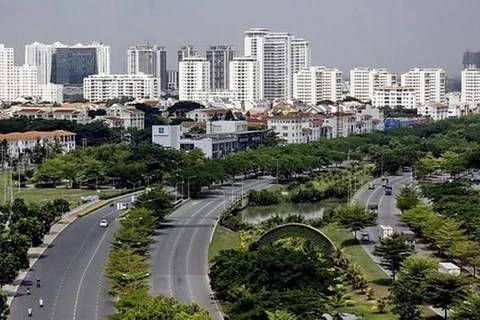Hanoi (VNA) – Joint efforts should be made to move from brown to green economy as Vietnam’s biodiversity is undergoing serious degradation, Minister of Natural Resources and Environment Tran Hong Ha has said.
Speaking at the ceremony held on May 28 in response to the International Day for Biological Diversity (May 22) and World Environment Day (June 5), Ha stressed that Vietnam is among 16 most biodiverse countries in the world. However, the nation’s ecosystem is being threatened by environmental pollution, ocean waste and the critical impacts of climate change.
“This requires all of us to make concerted efforts to promote development of a green and inclusive economy. Meanwhile, we should take more actions to heal the Earth”, Ha said.
As the theme 2022 International Day for Biological Diversity, “Building a shared future for all life” is an urgent order for all, raising the awareness of the significance of biodiversity – the foundation upon which people can build back better.
People should change their attitude towards nature by deploying natural resources in a sustainable manner and paying due heed to nature-based measures to settle such global issues as climate change, food security and livelihood, he stressed.
Echoing Ha’s viewpoint, UNDP Resident Representative in Vietnam Caitlin Wiesen said the Earth is facing three major issues, namely hotter weather than predicted, many wild animals on the verge of distinction and serious environmental pollution.
With strong commitments to handle climate change at the 26th United Nations Climate Change Conference (COP26), Vietnam is at a turning point to shift its development model that benefits both the nature and economy, she said. She highlighted that the model should be branched out based on a green approach and technologies for adaptation to climate change.
Particularly, Vietnam is in need of a reform movement on the environment and its climate so as to boost green and inclusive economic recovery post pandemic. This is part of the progress to achieve the target of becoming a high-income economy by 2045 while being able to protect natural resources for future generations.
Minister Ha urged ministries, sectors and localities to put forth transition of green and clean energy by reducing the use of fossil fuel vehicles, encouraging electrical ones, and developing green urban areas, among others.
Besides, they should sharpen focus on shifting brown to green economic growth model, branching out digital economy, low-carbon circular economy, as well as building a set of criteria for “a green life”.
It is necessary to effectively carry out the United Nations Decade on Ecosystem Restoration (2021-2030) as well as the programme to plant one billion trees. Also needed is to improve preservation work in tandem with development of an ecological economy and local sustainable livelihoods.
Localities should tackle environmental pollution in craft villages and industrial parks, promote classification of garbage, and apply advanced technology into waste recycling and treating, he said, adding competent sides should scale up efforts to prevent environmental crimes.
He expressed his belief that with sound direction of the Party, Government and State, coupled with dogged determination of the public and support from international organisations, Vietnam will reap great achievements in environmental protection work, and preservation of its nature and biodiversity.
“I hope each of us will make positive contributions to building a shared future for our Earth, and maintaining a balanced ecosystem for sustainable development of the humanity”, Ha said.
| Biodiversity is the living fabric of our planet. It underpins human wellbeing in the present and in the future, and its rapid decline threatens nature and people alike. According to the Global Assessment Report on Biodiversity and Ecosystem Services released in 2019 by the Intergovernmental Science-Policy Platform on Biodiversity and Ecosystem Services (IPBES) at UNESCO, the main global drivers of biodiversity loss are climate change, invasive species, over-exploitation of natural resources, pollution and urbanisation. The Global Report demonstrated the responsibility of human activities in the loss of biodiversity, which amounted to 75% for terrestrial ecosystems. This assessment also indicated that solutions existed and that it was not too late to act./. |
























